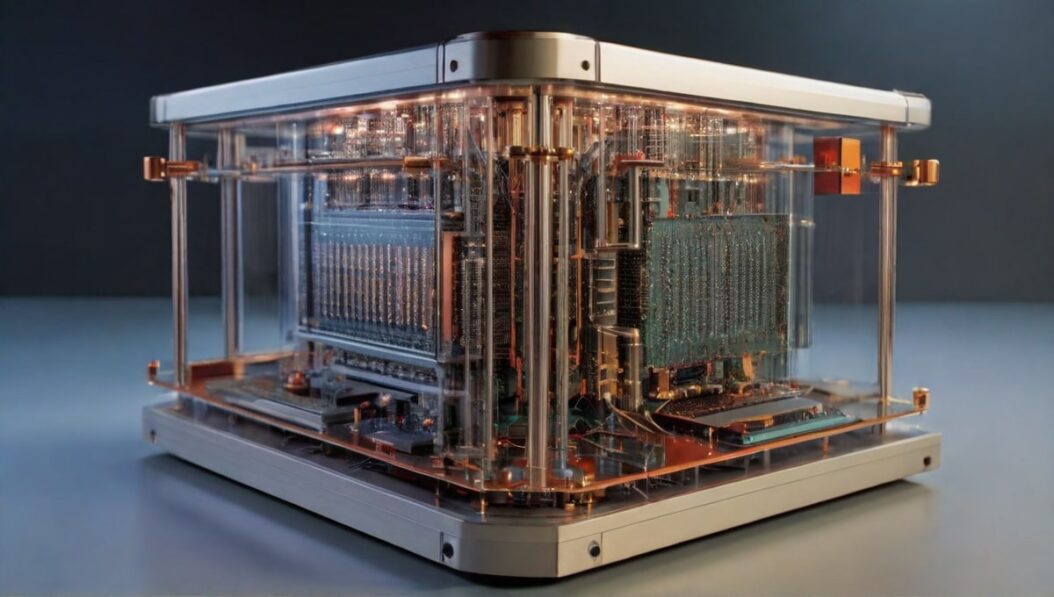Introduction to quantum computing
Quantum computing utilizes quantum mechanics phenomena such as superposition and entanglement to perform computations. By leveraging these quantum effects, quantum computers can solve certain problems much faster than classical computers. But what makes them so powerful?
Quantum parallelism enables massive parallel computation
One of the key advantages of quantum computing is the concept of quantum parallelism. This allows a quantum computer to evaluate a function for many different inputs simultaneously.
For example, a classical computer would have to calculate values sequentially, applying the function to one input at a time. But a quantum computer can apply that function to many inputs in superposition, in parallel, all at the same time.
Exponential scale of parallelization
The degree of parallelization grows exponentially with the number of qubits in the quantum computer. So while a classical computer is limited to sequential processing, a quantum computer can scale its parallel processing power exponentially.
This massive parallel computation capability enables quantum algorithms that provide exponential speedups over their classical counterparts for certain problems. Factoring large numbers and searching databases are two areas that can benefit from quantum parallelism.
Quantum entanglement enables faster optimization
Another source of power for quantum computers is quantum entanglement, where quantum particles become correlated in a way that is more complex than what is possible classically. Entangled qubits allow quantum algorithms to explore many potential solutions simultaneously when solving optimization problems. This provides a quadratic speedup over classical algorithms in some cases.
Optimization across combinatorial spaces
By leveraging entanglement, quantum optimization algorithms like quantum annealing can search through vast combinatorial spaces very efficiently. This makes quantum computing well suited to hard optimization challenges such as route planning, protein folding, financial modeling, and machine learning.
Interference from amplitude amplification boosts signal
In addition to superposition and entanglement, quantum computers also take advantage of the wavelike property of quantum particles. The ability to interfere and amplify waves is another unique quantum effect.
Quantum algorithms like Grover’s search algorithm and Shor’s factoring algorithm utilize amplitude amplification from constructive and destructive interference to boost the probability of measuring target states.
Higher success probabilities
This interference enables quantum computers to increase the likelihood of finding correct solutions on much shorter timescales than classical algorithms. By amplifying the signal above the noise, quantum computers can succeed with high probability in just sqrt(N) iterations rather than N iterations classically.
Error correction will enable scalable, reliable quantum computing
While quantum computing offers significant advantages over classical computing for certain use cases, the technology still faces some hurdles before reaching wide adoption.
The two biggest challenges are decoherence (loss of information from interactions with the environment) and the difficulty of correcting errors. Quantum states are fragile and tiny disturbances can introduce errors that get amplified exponentially as qubits scale up.
However, researchers are making rapid advances in quantum error correction techniques using quantum error correcting codes. This introduces redundancy to enable detecting and fixing errors without collapsing quantum superpositions or losing information.
Path to fault tolerance
As error rates drop steadily year after year, experts predict that we are on the path to achieving fault-tolerant quantum computers within this decade. This will allow reliable, scalable quantum computers capable of unleashing the full power and potential of quantum computing.
Outlook for quantum advantage this decade
With the pace of progress right now, many experts anticipate we will reach an era of “quantum advantage” in the 2020s where quantum computers can deliver practical capabilities beyond what classical supercomputers can achieve. In particular, applications in quantum chemistry, machine learning, cryptography, finance, and optimization problems are poised to benefit tremendously from quantum computing over the next 5-10 years.
While universal fault-tolerant quantum computers may still be 10-15 years away, special purpose quantum computers are already emerging that beat classical capabilities. 2023 and 2024 may well see some historic quantum achievements after the field has steadily built up over decades.
Conclusion
In summary, quantum computing derives its extraordinary potential from the exponential parallel processing capacity enabled by quantum superposition, as well as the quantum advantages from entanglement, interference, and amplitude amplification. Together, these quantum mechanical phenomena allow quantum computers to search through combinatorial spaces, optimize solutions, and boost success probabilities on timescales vastly faster than classical computing for certain problems.
Although error correction remains a challenge, rapid progress suggests we are on the brink of tapping into the tremendous power of scalable, reliable quantum computing over the next decade. This long anticipated quantum era promises to transform everything from drug discovery to AI to cybersecurity and more.
FAQs
What is quantum parallelism?
Quantum parallelism refers to the ability of quantum computers to evaluate a function for many different superposed inputs simultaneously, in parallel. This massive parallel computation capacity enables exponential speedups over classical computers.
How does quantum entanglement create power?
Quantum entanglement enables quantum computers to explore combinations of potential solutions in parallel when solving optimization problems. This provides a quadratic speedup over classical methods in some cases.
What is amplitude amplification?
Amplitude amplification describes how quantum algorithms can constructively interfere and amplify probability waves to increase the likelihood of measuring target states. This allows success with fewer iterations.
When will error corrected quantum computers arrive?
Experts predict that fault-tolerant, error corrected quantum computers will arrive within this decade, enabling reliable and scalable quantum computing.
What applications will first see quantum advantage?
Quantum chemistry, AI/ML, cryptography, finance, and optimization problems are the top applications likely to demonstrate quantum advantage over classical computing within 5-10 years.
- What is One Challenge in Ensuring Fairness in Generative AI: The Hidden Bias Problem - August 15, 2025
- How Small Language Models Are the Future of Agentic AI - August 15, 2025
- What Are the Four Core Characteristics of an AI Agent? - August 15, 2025

